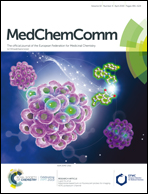Polybasic peptide–levofloxacin conjugates potentiate fluoroquinolones and other classes of antibiotics against multidrug-resistant Gram-negative bacteria†
Abstract
To address the rising threat of multidrug-resistant (MDR) bacteria, new therapeutic strategies must be developed. Efficacious drug combinations consisting of existing antibiotics and enhancer biomolecules called adjuvants offers a viable strategy. We have previously reported antibiotic hybrids consisting of tobramycin appended to different fluoroquinolones that possess potential as stand-alone antimicrobials as well as adjuvants. Herein, we report the synthesis of polybasic peptide–levofloxacin conjugates based on these tobramycin–fluoroquinolone hybrids. It was found that conjugating polybasic peptides to the fluoroquinolone levofloxacin, along with the addition of an aliphatic hydrocarbon tether, resulted in the ability of these compounds to potentiate fluoroquinolones and other antibiotics against MDR Gram-negative bacteria. The conjugates were able to potentiate ciprofloxacin, levofloxacin and moxifloxacin against MDR clinical isolates of Pseudomonas aeruginosa, Escherichia coli, Klebsiella pneumoniae and to a lesser extent, Acinetobacter baumannii. Preliminary data revealed that the conjugates interfered with active efflux of fluoroquinolones in P. aeruginosa. In addition, synergy was observed with a wide array of other antibiotics against P. aeruginosa, including those that suffered from restricted outer membrane penetration, suggesting that in addition to blocking active efflux, the polybasic peptide–levofloxacin conjugates possessed the ability to disrupt and permeabilize the outer membrane of Gram-negative bacteria.

- This article is part of the themed collection: Antimicrobial Resistance


 Please wait while we load your content...
Please wait while we load your content...